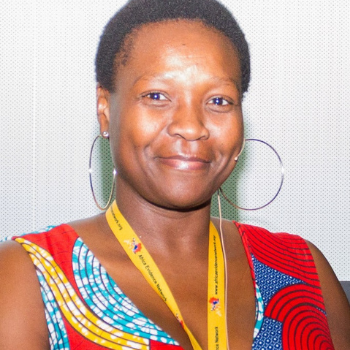UNDERSTANDING EVIDENCE USE COULD HAVE SAVED MILLIONS
“The most amazing thing about the AEN is that, we just share (information with membership) and we do not even know the full extent of our impact”
by Siziwe Ngcwabe
In her previous career, Siziwe was a programme manager responsible for implementing a billion Rand, multi-year national programme. Since her tenure at AEN and her insight into EIDM, she reflects back on that experience aghast at the lack of evidence to inform key decisions. Here she shares her reflections on a five year 1 billion rand project she lead in her previous job.
“What struck me the most is not only the wastage of money that occurred, but that of resources in general. The minister said “I want you guys to do this”. And we did it. Why we did it? What was the programme responding to? Where the number 2.5 million came from? Where were these children? What criteria of vulnerability and what targeted response? None of this information was forthcoming. In the end we may have reached 50% target if that, because the other half is the same children that were benefitting from this programme due to a lot of ‘double dipping’. I also felt that the children that were most vulnerable, that needed these services the most, were not being reached because we were scraping on the surface as we only worked in townships. We were working in “nice places”, and we did go into deep rural places and communities where these children were.
In retrospect, if we had evidence and mapped where these children are, and then mapped where these NGOs are and after that, just how much of a work force we would need. In the end, quality was compromised because we dint look at evidence. We did not look at so many things. And then this little outputs, we spent a billion Rand or so for five years. We wasted a lot of money for 5 years. Can you imagine if we did it correctly and reached the right children? She is horrified at the amount of wastage that she was not only played a role in but led. She relates how she would be ‘complying’ with a directive and would ensure that all the boxes are ticked, and how that perspective has shifted such that now she has questions.
AEN, and its intrinsic focus on EIDM has changed the way she looks at projects. She interrogates and understands that there may be different ways of looking at and responding to the same programme needs. Above all, Siziwe is grateful that with the AEN, she is in a space where she is allowed to think and dream bigger than she ever thought possible. She acknowledges that due to the AEN work she has more understanding and therefore respect for research and its importance, admitting that she writes more and has improved greatly there because she is required to do so in her role. She says “I am more in tune to better myself in terms of academic writing. I am more in tune to learn different ways of academic research to help the work that I do. Before I came to ACE I hated research, I never wanted to engage with it because it has always been painted to me as this big, humongous thing that is reserved for special people”.
The AEN newsletter has been pivotal in expanding her knowledge of the EIDM field. It has allowed her access to information on what was currently happening in the EIDM space. She got to learn more about what is happening the continent in relation to evidence informed decision making. Add to that the fact that information was not just limited to local, but she continues learning even what is happening internationally versus the local context and says “The newsletter gives me a sort of broad perspective on what is happening in this new space that I find myself in”. Her perspective on how projects should be planned for and implemented took a sharp and welcome turn as she became more and more exposed to the EIDM.
